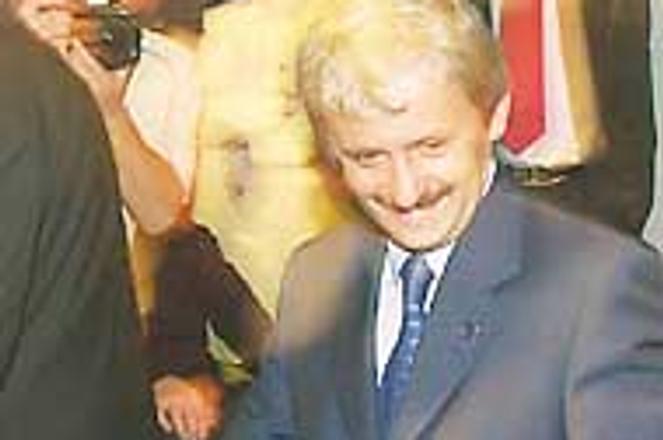PM DZURINDA (centre) exchanges victory grins with Deputy PM Ivan Mikloš (left).photo: TASR
A STRONG election result for Prime Minister Mikuláš Dzurinda's Slovak Democratic and Christian Union has left four Western-oriented right-wing parties positioned to form the country's next majority government.
The outcome has reassured Western governments about the maturity of Slovakia's young democracy, and about the sincerity of the country's commitment to joining the European Union and Nato in the coming months.
"This is positive news, as we now know practically for sure that a government can be shaped that will continue Slovakia's efforts towards European integration," said Eric van der Linden, head of the European Commission delegation in Bratislava.
In the run-up to elections, many Western diplomats had said a return to power by authoritarian former Slovak leader Vladimír Mečiar and his HZDS opposition party could be a barrier to Slovakia's Nato and EU membership.
While the HZDS won the election with 19.5 per cent, the result was its lowest in over a decade on the political stage, and the party was given no chance of forming a government.
"The dragon is slain, Dzurinda has been vindicated," said Paige Reffe from the US Committee on Nato, a bi-partisan Washington NGO.
Dzurinda's SDKÚ party took second place in the September 20-21 ballot with 15.09 per cent, surprising observers who had expected the Dzurinda government's economic belt-tightening since 1998 to have soured voters on the SDKÚ.
Together with the right-wing Hungarian Coalition Party (SMK), Christian Democrats (KDH) and New Citizen's Alliance (Ano), the bloc headed by Dzurinda's party controlled 78 seats in the 150-mandate parliament, good for a narrow 2-seat majority.
The leftist Smer party of Robert Fico finished third in elections with 13.46 per cent, well below several September polls which had shown Smer in first place.
The road to forming a government for the four right-wing parties was seen as difficult but not impossible.
First, with such a narrow majority in parliament, the parties will be vulnerable to pressure from hard-liners in the Christian Democrats, for instance, who may object to the SMK's demands for a Hungarian-language university or control of more land in the south of the country.
On the other hand, if the SMK's demands appear unlikely to be met, its own hard-liners may hold out for satisfaction.
"A narrow majority will make it difficult to find the will [to cooperate], while a majority of four seats or more will make it much easier," said Deputy PM for Economy Ivan Mikloš in an election-night interview with The Slovak Spectator.
The parties themselves launched negotiations on September 22, with KDH leader Pavol Hrušovský saying: "We insist that Slovakia needs a right-wing government."
"The results are good news. Three of the parties have worked together in the current government, which gives us a good basis for co-operation," said SMK leader Béla Bugár.
While Fico said that Smer had a "very high probability" of finding itself in the government, Dzurinda said at a press conference he saw no need to negotiate with Smer given the right-wing result.
Foreign Minister Eduard Kukan of the SDKÚ said the party would insist on Dzurinda again becoming prime minister.
The second factor which may complicate government talks is the need for haste.
The Nato expansion summit, at which Slovakia is expected to be invited to join, is scheduled for November in Prague. A month later the EU holds an enlargement conference in Copenhagen to decide which of the 10 applicants for entry will be joining.
Officials of both alliances have stressed the need for haste in forming a new Slovak government, to give them time to examine the new administration for soundness.
The parties officially have 30 days after elections to form a cabinet, but with a key EU report on Slovakia already having been moved forward from October 16 to 9, time is one luxury negotiators don't have.


